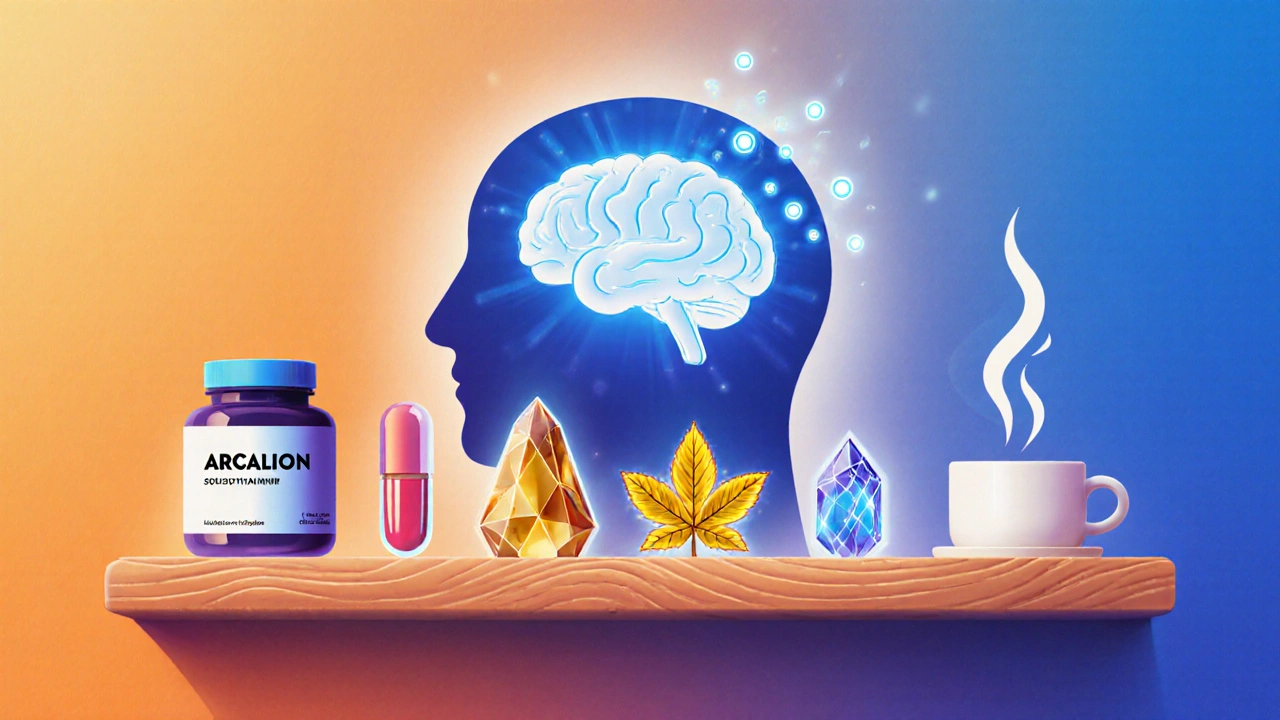Nootropic Selection Tool
Find Your Perfect Brain Boost
Answer a few questions about your needs to get personalized recommendations for brain supplements.
Answer the questions above to see your personalized recommendations.
If you’re eyeing Arcalion for a mental edge, you’re not alone - the supplement market is flooded with products promising sharper focus, less fatigue, and a boost in mood. But before you click ‘add to cart’, it helps to see how sulbutiamine stacks up against the most popular brain‑health alternatives. This guide walks you through the science, the practical differences, and the safety considerations so you can pick the right option for your goals.
What is Arcalion (Sulbutiamine)?
Arcalion is a branded form of sulbutiamine, a synthetic derivative of vitamin B1 (thiamine) designed to cross the blood‑brain barrier more efficiently. It was first approved in France in the 1990s to treat asthenia (persistent fatigue) and has since become a staple in the nootropic community.
How does Sulbutiamine work?
Sulbutiamine consists of two thiamine molecules linked together, which boosts its lipophilicity. This allows it to slip past the blood‑brain barrier and increase intracellular thiamine phosphate levels. Once inside neurons, it supports the production of acetylcholine and dopamine, two neurotransmitters linked to alertness and mood regulation. Clinical observations suggest a modest improvement in reaction time and a reduction in mental fatigue after a few weeks of consistent dosing.
Who might consider Arcalion?
- People experiencing chronic tiredness without an underlying medical condition.
- Students or professionals looking for a gentle, non‑stimulant focus aid.
- Individuals with low thiamine status who want a brain‑targeted boost.
Typical dosing ranges from 200mg to 400mg per day, split into two doses. Effects usually emerge after 2-3weeks, making it a slower‑acting but steadier option compared to caffeine‑based stacks.

Major Alternatives - A Quick Overview
Below are the most frequently mentioned nootropics that people compare with sulbutiamine. Each has a distinct mechanism, onset speed, and safety profile.
- Piracetam - the original racetam, enhancing membrane fluidity.
- Aniracetam - a more potent racetam with anxiolytic properties.
- Phenylpiracetam - a stimulant‑like racetam that boosts physical endurance.
- Noopept - a peptide‑like nootropic claimed to be 1000× more powerful than piracetam.
- Bacopa monnieri - an adaptogenic herb supporting memory consolidation.
- L‑Theanine + Caffeine - a classic stack balancing alertness with calm.
- Rhodiola rosea - an adaptogen that reduces stress‑induced fatigue.
- Modafinil - a prescription wake‑promoting agent.
Side‑by‑Side Comparison Table
| Supplement | Primary Mechanism | Typical Dose | Onset | Common Side Effects | Best For |
|---|---|---|---|---|---|
| Arcalion (Sulbutiamine) | Thiamine‑phosphate boost → neurotransmitter support | 200‑400mg daily | 2‑3weeks | Headache, mild agitation | Fatigue reduction, gentle focus |
| Piracetam | Membrane fluidity ↑ → neuronal signaling | 1.2‑4.8g daily | 30‑60min | Insomnia, anxiety (high doses) | General cognition, learning |
| Aniracetam | AMPA‑receptor modulation → anxiety reduction | 750‑1500mg daily | 45‑90min | Headache, GI upset | Creative work, mood support |
| Phenylpiracetam | Phenyl group adds stimulant effect | 100‑200mg daily | 15‑30min | Jitters, insomnia | Athletic performance, rapid focus |
| Noopept | Neurotrophic factor up‑regulation | 10‑30mg daily | 30‑45min | Headache, irritability | High‑intensity study sessions |
| Bacopa monnieri | Antioxidant & saponin‑mediated synapse growth | 300‑600mg (standardized) | 2‑4weeks | GI upset, fatigue (early) | Memory consolidation |
| L‑Theanine + Caffeine | L‑Theanine → α‑wave increase; Caffeine → adenosine block | 100mg caffeine + 200mg L‑Theanine | 5‑15min | Jitters (caffeine excess), insomnia | Quick alertness without crash |
| Rhodiola rosea | Adaptogenic cortisol modulation | 200‑400mg daily | 45‑60min | Dizziness, dry mouth | Stress‑related fatigue |
| Modafinil | Wake‑promoting via orexin & dopamine pathways | 100‑200mg daily (prescription) | 30‑60min | Headache, reduced appetite | Shift‑work, severe sleep‑wake disorders |
How to Choose the Right Option
Look at three decision points:
- Desired speed of effect. If you need a boost within an hour, caffeine‑based stacks or phenylpiracetam win. For a slow, steady lift, sulbutiamine, bacopa, or rhodiola are better.
- Tolerance for stimulants. People sensitive to jittery feelings should avoid high‑dose racetams or modafinil and lean toward non‑stimulant options like arcalion or bacopa.
- Regulatory comfort. Over‑the‑counter supplements (arcalion, bacopa, rhodiola) carry fewer legal hurdles than prescription‑only agents such as modafinil.
Combine the answers with your budget - daily cost ranges from under $0.10 for caffeine to over $2 for modafinil equivalents - and you’ll have a clear shortlist.

Safety, Interactions, and Legal Landscape
All the substances listed have a decent safety record when used at recommended doses, but a few red flags deserve attention:
- Sulbutiamine. May amplify the effects of other thiamine‑related drugs; rare cases of skin rash have been reported.
- Racetams. Generally well‑tolerated but can cause anxiety if combined with high‑dose caffeine.
- Modafinil. Requires a prescription in most countries; off‑label use can lead to dependence.
- Herbal adaptogens. Rhodiola and bacopa can interact with antidepressants, so a quick chat with a healthcare provider is wise.
For pregnant or nursing individuals, stick to well‑studied, low‑risk options (e.g., low‑dose L‑theanine) and avoid prescription wake‑promoters.
Practical Tips for Trying Arcalion or Its Alternatives
- Start low, go slow. Begin with half the suggested dose, monitor how you feel for a week, then adjust.
- Cycle stimulants. If you experiment with phenylpiracetam or modafinil, limit use to 5‑days on, 2‑days off to prevent tolerance.
- Stack wisely. A popular, low‑risk stack is 200mg sulbutiamine + 200mg L‑theanine in the evening to support sleep‑balanced cognition.
- Track outcomes. Use a simple spreadsheet: note dosage, time of day, perceived focus, energy, and any side effects.
Remember that supplements work best alongside solid sleep, nutrition, and regular exercise - no pill can replace those fundamentals.
Frequently Asked Questions
Is Arcalion safe for daily use?
When taken at 200‑400mg per day, most users report mild side effects only. Long‑term studies are limited, so periodic breaks (e.g., 2‑week off every 2‑3months) are advisable.
How does sulbutiamine differ from regular thiamine supplements?
Regular thiamine struggles to cross the blood‑brain barrier, meaning most of it stays in peripheral tissues. Sulbutiamine’s lipophilic design lets a higher percentage reach the brain, directly supporting neuronal metabolism.
Can I combine Arcalion with caffeine?
Yes, many users pair a low dose of sulbutiamine with a cup of coffee to smooth out the caffeine crash. Start with 100mg sulbutiamine and 50mg caffeine to gauge tolerance.
Is there a natural alternative to sulbutiamine?
Rhodiola rosea and bacopa monnieri are plant‑based adaptogens that improve energy and memory without the synthetic thiamine structure. Their effects also appear after a few weeks, similar to sulbutiamine.
Do I need a prescription for any of the listed alternatives?
Modafinil is prescription‑only in most jurisdictions. All other substances in this guide are sold as over‑the‑counter supplements, though quality can vary between brands.




Malia Rivera on 17 October 2025, AT 14:25 PM
Freedom of mind begins with a supplement that isn’t shackled by foreign patent sharks, so sulbutiamine’s home‑grown chemistry feels like a silent protest. The way it eases fatigue without the jitter of caffeine is a subtle act of rebellion against the commercial hype. Even a lazy critic can see that a steady lift is preferable to a fleeting buzz.